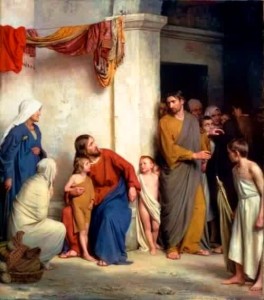Thoughts on Today’s Lessons for Sept. 20, 2015

Christ With the Children, Carl Heinrich Bloch, 19th century Danish painter.
Doing the right thing doesn’t always make people happy. Sometimes our best efforts to be good can get us in trouble. Look for this theme today and think about how our spiritual ancestors in Scripture dealt with this tough reality. The Wisdom of Solomon from the Apocrypha, written in King Solomon’s name not long before the time of Jesus and the evangelists, poses a stark choice: If you’re wise, if you follow God’s ways, the unwise may call you a trouble-maker and try to get revenge. But they, blinded by wickedness, will ultimately pay a higher price.
Psalm: Psalm 54
This Psalm, attributed by tradition to King David, is noted with the curiously specific advice that it be accompanied by stringed instruments! It recalls a time when the young David had to flee in terror from an angry Saul who sought to kill him. This narrative resonates with the reading from Wisdom: When insolent and ruthless enemies seek our lives, God’s laws will not hold them back. This is a time to pray, to call on God who delivers us from trouble and upholds our lives.
Second Reading: James 3:13-4:3, 7-8a
If we have wisdom and understanding, our lives will reflect that in our good and gentle works. Bitter envy and selfish ambition do not come from God. Greed and craving get us in trouble; coveting what others have leads us into conflicts, disputes, even murder. Rather, sow peace in order to grow peace. Draw near to God, and God will grow closer to us.
Gospel: Mark 9:30-37
Sometimes the Apostles seem almost ridiculous in their cluelessness. Today Jesus tells them for a second time that he must suffer, be rejected, killed and then rise again. Not only do they still not get it, but they are afraid to ask. Did they think long and hard about this? Apparently not. Rather, they got off to themselves and argued about which of them was the greatest. Jesus, who must have been thoroughly exasperated, showed them a small child. Following Jesus is not about greatness and power, he said. It is about welcoming the smallest and weakest among us.
